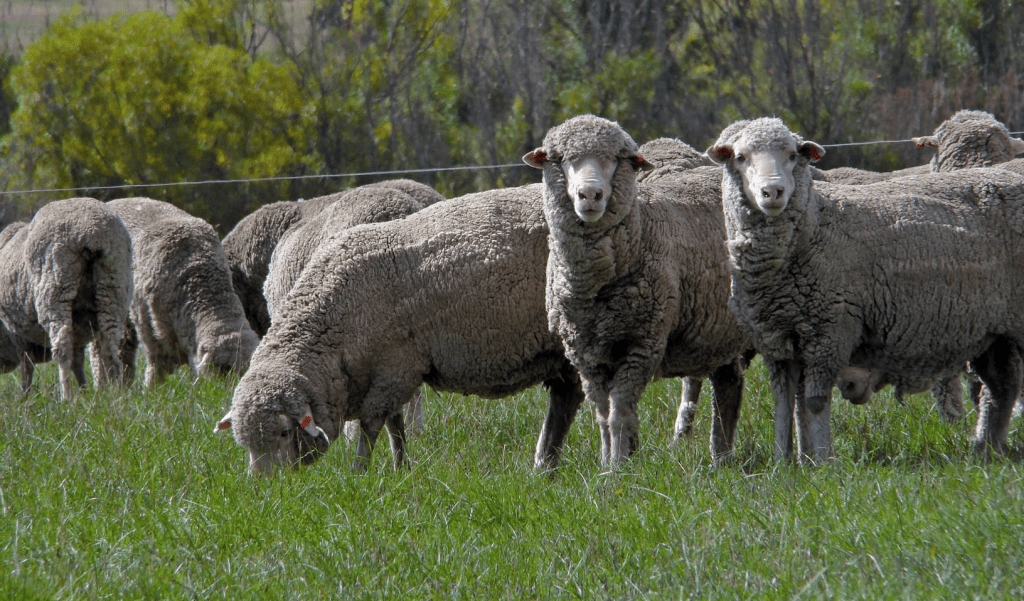
WA sheep producers think the grass is no longer as green for sheep meat or wool production. Image – DPIRD
WESTERN Australian sheep producers have declared their intentions to drop breeding ewe and flock numbers, and lift cropping acreages, as concerns about the impending phaseout of the live export trade bite.
Meat & Livestock Australia and Australian Wool Innovation’s latest producer intentions survey has shown that WA producers are intending to decrease their breeding ewes and flock numbers, more than any other state, with increasing land allocation towards cropping.
Producers in WA are having a clear dampening impact on the national sentiment results. Overall producer sentiment within the Australian sheep meat and wool sectors is positive, but the net sentiment on the wool industry’s future at +13 for non-WA producers nationally, but only +1 in WA.
The sentiment for the future of sheep meat declined over to be +27 for non-WA producers and -48 for WA. This represents a drop from 68 sentiment points in October 2022 to May 2023, a fall of about 40 points.
The impending decision on the live export trade for sheep meat is weighing heavily on these producers, the survey report said.
The survey found that half of the 1958 producers surveyed cited weather as the chief concern impacting on-farm decision making.
Merinos continues to be the dominant breed on hand for breeding ewes and wethers at 64 percent and 87pc respectively. First cross breeding ewes make up 14pc of total numbers.
The survey found that producers recorded a three-way split on stock intentions, with about a third each saying they would increase, maintain, or decrease breeding ewe numbers in the next 12 months.
The survey participants respond to an invitation during late April and early May, where the results were then weighted using the latest available Australian Bureau of Statistics (ABS) data to produce industry estimates.
Concerns around the weather and seasonal conditions are impacting producers from right around the country, with 50pc of sheep producers nationally cite weather as the number one issue affecting their on-farm decision making. About 31pc cited weather as their main off-farm external factor when it comes to running their business.
MLA’s market information analyst Jenny Lim, said while sentiment from producers declined in all states, Western Australian producers’ overall sentiment declined by 90 points between October 2022 and May 2023.
“WA producers are noting that they have extra sheep on-farm, with processors working through a significant backlog and an oversupply of lambs,” Ms Lim said.
The May 2023 survey had a specific focus on understanding the profile of Australia’s breeding ewes and wether flocks.
Of the estimated 46 million breeding ewes on hand, Merinos made up 64pc of total breeding ewe flock, while first cross sheep represented 14pc and prime lambs represented 12pc.
Producers in New South Wales, South Australia, Queensland and Western Australia also have a larger proportion of Merinos, with Tasmania and Victoria reporting lower proportions.
The mixed response of producers around their breeding ewes flock in the next 12 months meant:
- 30pc indicated they would increase their breeding ewe flock size.
- 38pc indicated they would remain unchanged.
- 32pc indicating they would decrease their breeding ewe flock size.
The growth position was stronger among producers in Queensland, although this state represents a small proportion of the overall national flock. Western Australian producers were more likely to forecast a decrease over the next 12 months.
View a full copy of the May Sheep Producers Intentions Survey here.

It is long overdue the the ‘live’ animal trade should be banned, and if farmers really cared for the welfare of their animals that are living, feeling creatures, besides a financial business, they would not want to continue this cruel live animal trade either.
The ships that transport/carry live animals are, I believe, generally old rust buckets that ply our oceans and usually operate under flags of convenience. This also presents dangers for our coastlines and the oceans as a whole.
Having followed this issue over the years, I believe the live animal trade to be extremely cruel and am of the strong view that the banning of this cruel trade cannot come too soon. It has been going on for too long from a supposedly advanced and civilised country like Australia.
Farmers will need to adapt. Indeed, they will have to adapt in such a country like other people particularly with climate change which unfortunately will most likely have a very detrimental impact on Australia and this will be a problem particularly for farmers and growers and for the general public too.
I’ve already adapted for climate change, south-west Western Australia has had a drying trend going on for years. Just what have you done? My dams are bigger and all have deep drains. I have more silos. My stocking rates are more conservative. I am sure if you went to an Australian meat works you would want that banned. You are just guessing on the state of the ships. There is not enough kill space in the WA meatworks. I am sure you would not want to see farmers shooting stock they can’t sell? What a waste and it is already happening to some extent. But you don’t see that, so it mustn’t be happening.